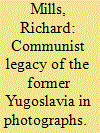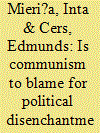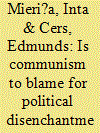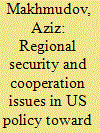| Srl | Item |
| 1 |
ID:
098360


|
|
|
|
|
| Publication |
2010.
|
| Summary/Abstract |
It is impossible to travel through the former Yugoslavia without constant reminders of the region's recent past. Socialist-era buildings retain their prominent city centre locations in the capitals of all of the successor republics, whilst the countryside remains littered with monuments honouring the achievements of Tito's victorious Partisan Army. There is also no escaping Yugoslavia's violent dissolution, with many villages, towns and cities still struggling to come to terms with the physical damage inflicted by war. The following photographic selection attempts to offer a brief insight into those relics of the past which, through their physical presence, continue to have an impact upon the present day. These photographs were taken by the author between 2007 and 2009.
|
|
|
|
|
|
|
|
|
|
|
|
|
|
|
|
| 2 |
ID:
132938


|
|
|
|
|
| Publication |
2014.
|
| Summary/Abstract |
In this article, we apply a new, original technique of cohort analysis to test empirically whether political disenchantment in the post-communist countries of Central and Eastern Europe can be linked to the previous political culture. On the basis of International Social Survey Programme 1996 and 2006 data we find a surprisingly similar and unique cohort effect in all analysed post-communist countries, reflecting persistent generational differences in perceived political competence (interest and understanding of political processes). However, the communist legacy does not seem to be important for explaining low self-efficacy or distrust in political authorities and their responsiveness to citizens' demands.
|
|
|
|
|
|
|
|
|
|
|
|
|
|
|
|
| 3 |
ID:
133748


|
|
|
|
|
| Publication |
2014.
|
| Summary/Abstract |
In this article, we apply a new, original technique of cohort analysis to test empirically whether political disenchantment in the post-communist countries of Central and Eastern Europe can be linked to the previous political culture. On the basis of International Social Survey Programme 1996 and 2006 data we find a surprisingly similar and unique cohort effect in all analysed post-communist countries, reflecting persistent generational differences in perceived political competence (interest and understanding of political processes). However, the communist legacy does not seem to be important for explaining low self-efficacy or distrust in political authorities and their responsiveness to citizens' demands.
|
|
|
|
|
|
|
|
|
|
|
|
|
|
|
|
| 4 |
ID:
118746


|
|
|
|
|
| Publication |
2012.
|
| Summary/Abstract |
It stands to reason that at the early stage of independence the five republics in the Central Asian region-Kazakhstan, Kyrgyzstan, Tajikistan, Turkmenistan, and Uzbekistan-previously closely linked to the Soviet economic and political systems, faced a number of challenges, most of which were inherited from the Czarist-Soviet regimes. Coping with the challenges posed by the transition period required foreign support, and all the republics, except Turkmenistan, have been engaged in active cooperation with global powers such as the U.S.
|
|
|
|
|
|
|
|
|
|
|
|
|
|
|
|